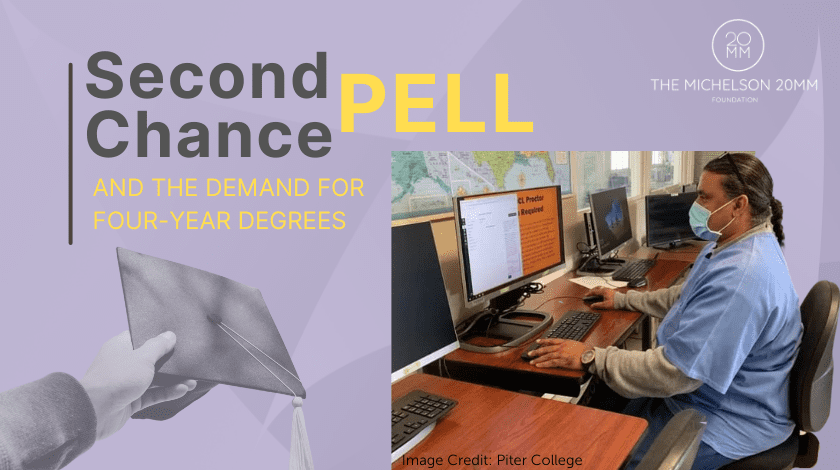Damien Busby, pictured above, has earned six associate degrees in prison and is working towards his bachelor’s through Pitzer College’s Justice Education Initiative.
By Kenia Miranda Verdugo
National estimates put the number of colleges teaching in prisons at around 200, most of which are community college associate degree programs. California has led the nation in expanding postsecondary opportunities for incarcerated students for the last eight years since lawmakers passed SB 1391, which enabled community colleges to start teaching in-person courses behind bars. Today, 34 of the state’s 35 prisons offer face-to-face courses, serving approximately 15,000 incarcerated students. As the number of men and women completing transfer-worthy associate degrees in prison has grown, so too have calls for the opportunity to create four-year degree paths in prisons.
Countless students in prison reach out to Brant Choate, director of the Division of Rehabilitative Programs for the California Department of Corrections and Rehabilitation (CDCR), stating that they have completed their associate degrees and are ready for the next step. Some incarcerated students even have up to seven associates degrees, which only demonstrates the yearning for education within prisons.
Despite the demand, there are presently only two public bachelor’s degree programs offered in California’s sprawling state prison system, offered by California State University, Los Angeles, at a men’s maximum security facility in Lancaster. As state funding for in-prison education increases, so have the plans to include more California State Universities programs within prisons.
But what about the University of California programs? Even private universities, such as Pitzer College, have recently kick started an “Inside Out” education model–the first ever in-prison bachelor’s program built on the “Inside-Out” curriculum. As CDCR explains it, “In this model, each class is comprised of an equal number of CDRC students (inside) and Claremont Colleges (outside) students. Staff from five Claremont Colleges provide face-to-face instruction and administrative support, with the final degree awarded by Pitzer College.”
Two years ago, the Michelson 20MM Foundation provided a $25,000 Spark Grant for a group of formerly incarcerated graduate students to help with the planning and kick start the first University of California (UC) bachelor’s degree-granting program in a California state prison, which was bolstered by Google’s matching grant that provides textbooks and supplies for the students. With support and funding from California’s Governor and legislature during this past legislative year, UC Irvine will become the first school in the UC system to offer a bachelor’s degree to individuals who are incarcerated. In July, the university announced that the State of California is providing $1.8 million–five years of funding–for LIFTED.
“[UC Irvine’s LIFTED program] fulfills the mission of higher education in California – that anyone anywhere can access a UC education,” says Keramet Reiter, UCI professor and LIFTED director. “The UCs are under constant pressure to expand and diversify. And this is a student body that’s incredibly diverse and very excited to become part of the UC community. It’s recognizing that if they meet the qualifications for admission, these are students that the state could and should be serving.”
With a cohort of 26 students from Richard J. Donovan Correctional Facility, the LIFTED program began this fall. In order to be accepted into the program, potential students must complete an AA degree in sociology (with a 3.5 GPA) at Southwestern College, a community college in Chula Vista, California, which is possible within the facility and offers a pathway into the LIFTED program.
The UCI LIFTED pilot program may be the first of its kind within the UC system, but it definitely won’t be the last. As the momentum for education in prison continues to grow and federal Pell Grants will be given to incarcerated students in July of 2023, we must continue to advocate and support more education programs provided by public universities within our prisons. As research concludes: education is the ultimate key to reduce recidivism.
Michelson 20MM is a private, nonprofit foundation seeking to accelerate progress towards a more just world through grantmaking, operating programs, and impact investing. Co-chaired and funded by Alya and Gary Michelson, Michelson 20MM is part of the Michelson Philanthropies network of foundations.
To sign up for our newsletter, click here.
